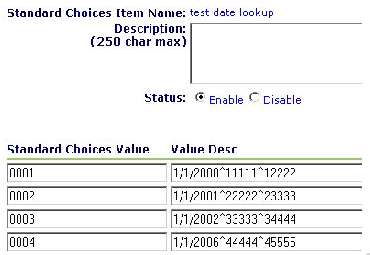lookupDateRange
Matches dateValue against a series of dates in the standard choices called stdChoiceEntry.
Version
1.4
Parameters
| Parameter | Type | Description |
|---|---|---|
| stdChoiceEntry | string | Item Name of standard choices used as lookup table. |
| dateValue | string | Date that determines which row to return. Use string in format MM/DD/YYYY, e.g. "07/21/2000". |
| valueIndex (optional) | integer | Determines the value to return. Defaults to 1, the first value. |
Returns
If dateValue falls after date 1 but before or on date 2, returns the value following the caret (^) on date 1's right. If the function uses the valueIndex parameter, returns the value immediately after the valueIndex'th caret (^), following the matching date.
Notes
Set up the standard choices lookup table as follows:
Value column = Four digit incremental index. Must be left zero padded to four digits. Entire table must be consecutive.
Value Desc column = at least two values separated with the caret (^) symbol. Returns the first value as the effective date (MM/DD/YYYY format). Returns the remaining values by the function.
Examples

lookupDateRange("test date lookup","5/5/2002") returns 33333
lookupDateRange("test date lookup","1/5/2000",2) returns 12222
lookupDateRange("test date lookup","1/1/2010") returns 44444
lookupDateRange("test date lookup","1/1/1999") returns undefined since there is no entry effective for that date.
lookupDateRange("test date lookup","1/5/2000",3) returns undefined since there are not 3 values.
Sample script controls:
01 appMatch("Building/Residential/SFD/*") ^lookupIndex=1
02 appMatch("Building/Residential/Duplex/*") ^ lookupIndex = 2
03 true ^ addFee("FEECODE","FEESCHED","FEEPERIOD", lookupDateRange("test date lookup", filedate, lookupIndex), "Y")